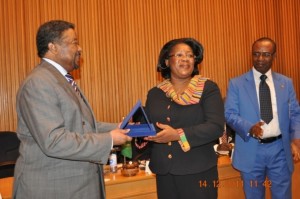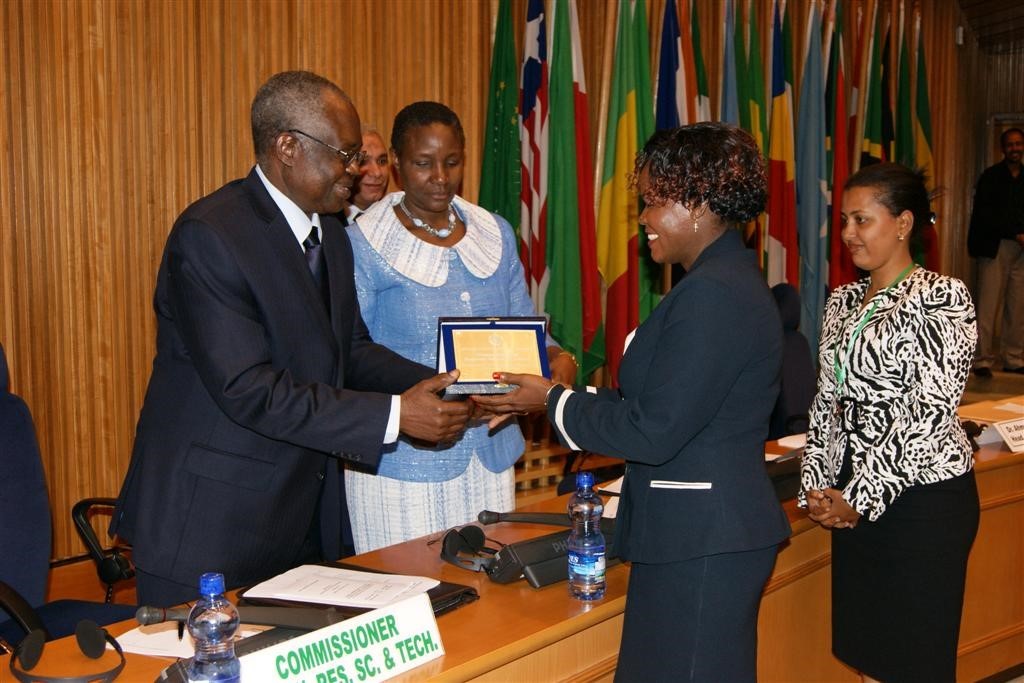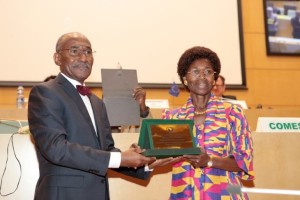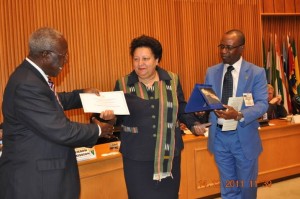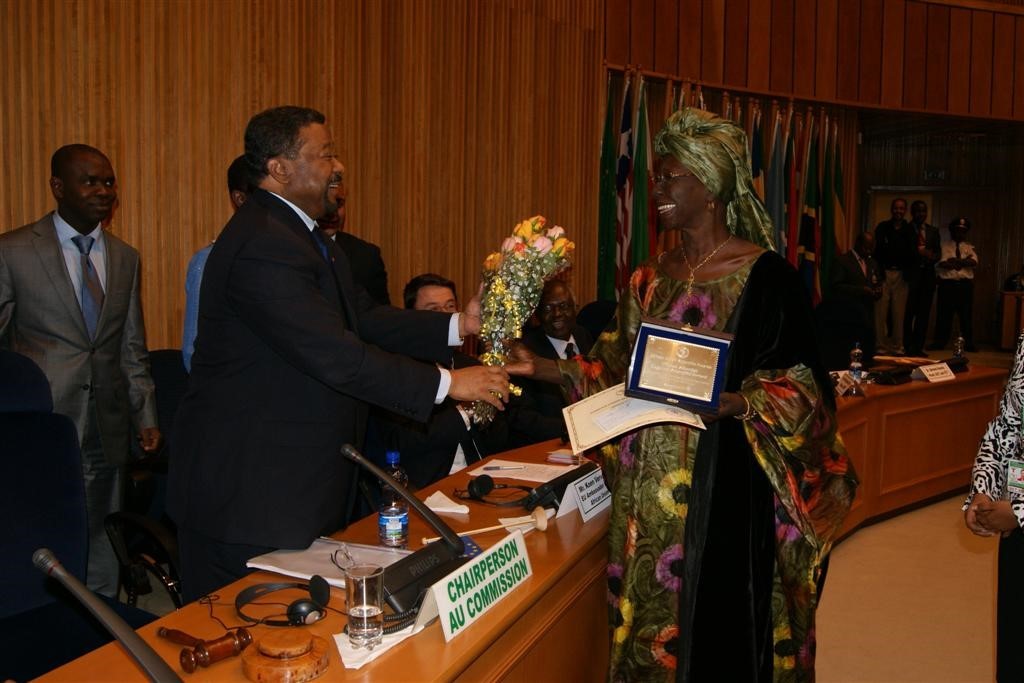African Union regional awards for scientific women “Kwame N’krumah “
|
In collaboration with the African Union Commission, the ECOWAS Commission is organizing since 2010 the “African Union KWAME N’Krumah Regional Award for Scientific Women” as part of the awareness that the development of the region requires popularization and promotion of research in all areas, namely Science, Technology and Innovation. This prize is exclusively dedicated to women. It is actually an invitation for them to participate in activities related to Science, Technology and Innovation as well as to reduce their under representation in these areas. The award also offers the opportunity to improve their access to education, scientific careers, and promotes greater use of science in their daily lives. A prize worth $ 20,000 will be awarded in each of the following scientific areas:
In preparations for the next round of awards, we present the list of previous winners of the awards in the region as follows: |
Basic Sciences, Technology and Innovation |
| 2013 Winner of AU-ECOWAS Women Scientists Award Basic Sciences, Technology and Innovation Professor Yvonne Bonzi-Coulibaly  |
|
Yvonne Bonzi-Coulibaly is the first and one full professor in Chemistry at Ouagadougou University. She defended a PhD thesis (1987) in Organic chemistry at Strasbourg University (France). She gives different courses in Organic Chemistry, Mass Spectrometry and Pollution at Ouagadougou University. She was deputy Director (2002-2004) and Director (2005-2007) of the Environmental Center of Ouagadougou University. Thus from 2008 to May 2013, Mrs Bonzi was the first Director of Research at Ouagadougou University. Since 2002, she is in charge of the Organic Chemistry Laboratory renamed (in 2014) Analytical Environmental and Bio-Organic Laboratory. She also gave technical and scientific supports in journal editorial boards, special committees or Scientific Advisory Committees within her home university and also international institutions like International Research Development Center (IRDC), Agence Universitaire pour la Francophonie (AUF), International Foundation of Science (IFS), etc. She has been coordinator of EXCEED NETWORK on water (2011-2014) and advocate in 2013 for HOPE Project, an UNESCO Initiative. She is a member Science Academy in Burkina Faso.With high experience in preparation of photosensitive phospholipidic probes and large spectrum of pyrylium salts with their precursors, she combines well organic synthesis and natural products valorization supported by high level analytical tools. Her scientific contribution is real in the 10 years work in a large multidisciplinary investigation on environmental pesticide pollution in agro-ecological zones in Burkina Faso and Benin. As sustainable solution in agricultural practices, she carried out an intensive work in the formulation of plant bio-pesticides. For that, plants extracts were submitted to chemical transformation or adsorbed on cellulosic material for antifungal properties. In addition to her scientific publications (47), vulgarization documents (3) contributions to international books (3) and real enthusiasm to give scientific conferences on water issues, pesticides, pesticidal plants, she promoted with partners many projects, organized international conferences. She supervised 19 master students and four defended their Ph.D. She believes that the end of each scientific research activity is the beginning of one face of development and for sustainable development; she is engaged in capacity building of junior’s researchers. With the KNAU price, her scientific animations for scholars and students increase in Burkina Faso between the one in the amphitheater at Ouagadougou University full of more than 1000 students and the one in a suburb poor primary school. |
| 2011 Winner of AU-ECOWAS Women Scientists Award
Basic Sciences, Technology and Innovation |
|
Born on 25 November 1962 in Abidjan, Rita Carolina Angora Yao Kakou finished her primary education in flying colours then went on to pursue her secondary education at the Lycée Sainte Marie in Abidjan; and in September 1982 she commenced studies at the Université d’Abidjan from where she obtained a BSc in Crystallography in October 1987. She completed her studies at the Université de Provence (Aix-Marseille I) and in July 1990 defended a University doctoral thesis. In February 1991, she was recruited by the Université Félix Houphouët Boigny of Cocody where she rose from teaching assistant, assistant lecturer, senior lecturer to finally becoming a tenured Professor in 2008. For about twenty years, she was actively involved in several research projects in collaboration with European Universities (University of Bucharest, and Université De Aix Marseille I) and with some universities in the ECOWAS region (Université de Ouagadougou and Université Cheik Anta Diop in Dakar); The research projects led to several publications in international journals. At national level, a number of the research projects focused on the development of products that could be used in the pharmaceutical, feeding and medical fields. Professor Rita Yao was a member of the UFR Board and Educational Commission for Sciences of the Structure of Matter and Technology. Since 2001, she has been a Member of the Board of the Department of Sciences and Matter at the INP-HB, Yamoussoukro, she is also member of the Scientific Board of the école doctorale de Physique. Since 2007, she has also been assistant director of the Laboratory of Crystallography and Molecular Physics. For several years, she has supervised Masters and PhD students. She is the Head of the Department of Physics and heads the Masters in Physics programme. She has also presided over several juries (review boards for theses, Baccalauréat and examinations for the school of telecommunications (ESATIC). In July 2009, she was honoured by the General Council of Abengourou. The African Union Kwame Nkrumah Regional Women Scientist Award in the field of Basic Sciences, Technology and Innovation was conferred on her in December 2011: Professor Rita Yao was conferred with National Merit Officer in August 2013, she is also Vice President of the Association of Women Inventors and Entrepreneurs of Côte d’Ivoire (AFIECI) ; representative of the association of women researchers of Côte d’Ivoire (AFEMCI-CI); member of the National Women’s Council (CNF) created in March 2015. She participated in several missions, internships and conferences in Côte d’Ivoire and abroad and to date has produced about 15 posters and 48 publications in International journals. She has supervised several Masters degree candidates, 3 PhD students and 3 others are undergoing training for their thesis. Professor Rita Yao is tenured professor of Atomic and Molecular Physics, PhD in Physical Sciences with focus on Crystallography and Molecular Physics, from Université de Provence, she holds a Masters in Basic Physics. Professor Rita Yao is married with two children. In the course of her work, Professor Rita Yao, thanks to her firm grasp of vibrational spectroscopy became interested in:
She then got involved in a public health issue submitted by the biophysics laboratory of the Faculty of Medicine of Abidjan: subsequently there was need to determine and quantify the chemical components of a collection of gallstones and kidney stones gathered from a cross-section of Abidjan’s population. Two types of outcomes were expected:
We must emphasize here that beyond the relevant responses provided, the work enables the physicist that she is, to develop a firm grasp of chemometrics, using that knowledge to explore new horizons in the field of quantitative data analysis. As regards crystallography, an initial study by Prof. Rita Yao, on isochromene derivatives, pyridinium salts and iminium salts helped resolve tautomerism and alignment issues expressed by Chemists. The arrangement of a molecule and the possible interactions with other molecules are fundamental to the properties of many compounds. As a result, the Quantitative Structure-Activity Relationships and docking are today used for development of new medicines. The scientific community is showing considerable interest in Benzimidazole derivatives as they form the fundamental property of many pharmaceutical compounds. These compounds have a wide range of biological activity (antibacterial, antifungal, anti-tumour, antiviral, anti-cancer…) In collaboration with the Organic Chemical Laboratory of Université de Cocody, which synthesized new molecules of the component, Prof Rita Yao worked to come up with the structural and molecular standard for the compounds for subsequent modelling and docking with a view to studying the biological activity of these molecules. The entire project led to 48 publications in international scientific journals. |
|
2010 Winner of the AU—ECOWAS Women Scientists Award |
| Geneviève Kabre née Barro is Burkina Faso’s first female Senior Lecturer in Mathematics, focusing on digital and computer analysis (CAMES 2009, COTE A) Burkina Faso. She is a researcher at the Biomathematics, Computer and Digital Analysis Laboratory, (LANIBIO), UEMOA Centre of Excellence, the Pure and Applied Sciences, Training and Research Unit, (UFR/SEA), University of Ouagadougou.She supervises Master’s and Doctorate level Mathematics students and teaches Mathematics and Applied Quantitave Techniques.She is the author of about ten publications indexed by the Abstracts in SCI journals distributed worldwide.She holds a single doctorate in Applied Mathematics, specializing in computer and digital analysis as well as a Professional Masters degree in Statistics, specializing in Econometry and Statistics from Université de Toulouse1 (France) in 2011 and a Masters in Education Science, specializing in the Use of Information and Communication Technology in Teaching and Training (Université Louis Pasteur de Strasbourg(France) and Université de Mons Hainaut(Belgium) 2008.She has certification in self-assessment, evaluation and accreditation of Universities from Ecole polytechnique de Montréal Educational Assistance Bureau (2014), of CAMES (2015) as well as in the design and production of an A to Z. MOOC from École normale supérieure de Cachan (France), 2014. She is editor of the journal International Review of Education (REVI). She has participated in 86 presentations, symposiums, workshops, seminars, conferences, scientific research days and missions. She has been a Member of the Board of Unions of Researchers (since 2009) and member of the scientific council as senior lecturer of the Université OUAGA II.She is a member and/or expert of several international bodies: AUF (member of MIRRTICE of the Francophonie Institute for Distance Learning and Knowledge Building (IFIC) 2014 ; Member of the Committee of Experts evaluating applications for PhD research grants, since 2008; Member of the Committee of Experts in the set up, design and management of Open and Long Distance Training (FOAD), since 2010) ; UVA (Member of the committee of experts evaluating training programmes 2014) ; ECOWAS (Member of the ad-hoc committee of Experts on Distance Education, 2010 ; Member of the Regional Scientific Committee (CSR) analyzing the Science and Technology Policy document plan) ; CEDO (Member of the Committee of experts in the use of Information and Communication Technology for Education and Training, 2010) ; FTI (Member of the committee of experts in the use of Information and Communication Technology for Education and Training at the Institute of Sciences.In charge of the FOAD Science and Education programme, 2010) ; Chair, Unesco Gender, Sciences, Societies and Sustainable Development (Member of the Organ and Director of ICT) ; AFRICAMPUS (Member of the Scientific Committee) ; CAMES (International Expert in evaluation, “self-evaluation, evaluation and accreditation of universities” selected by the AUF-CAMES joint steering committee, 2015).She was instrumental in the design and management of the FOAD for Université OUAGA II in conjunction with AUF and EENI Global School. Through the FOAD, Burkina has helped to showcase E-Learning.As a result, Burkina Faso was ranked « SECOND » among French-speaking countries, after France, for the quality and size of its FOAD at the AUF, (TV5 Monde, March 2014) : http://www.tv5.org/cms/chaine-francophone/Revoir-nos emissions/Destination- Francophonie/Episodes/p-28519-Destination-Burkina-Faso.htm.She won the title Femme modele (National Women’s Forum, Ouagadougou Burkina FASO, 2008). Every year, since 2008, she is been invited as model woman to mentor, provide counsel to and motivate young girls in Burkina, and also in other countries via the NET, into developing a career in science. She was awarded winner of the 2010 African Union Science Award – Basic Sciences, Technology and Innovation category (African Union Awards Ceremony, Addis Ababa, Ethiopia).She is married with two children, loves sports (swimming, aerobics) ; nature (animals, green space, flowers) ; reading ; movies ; music ; cooking ; landscape gardening and travelling. |



